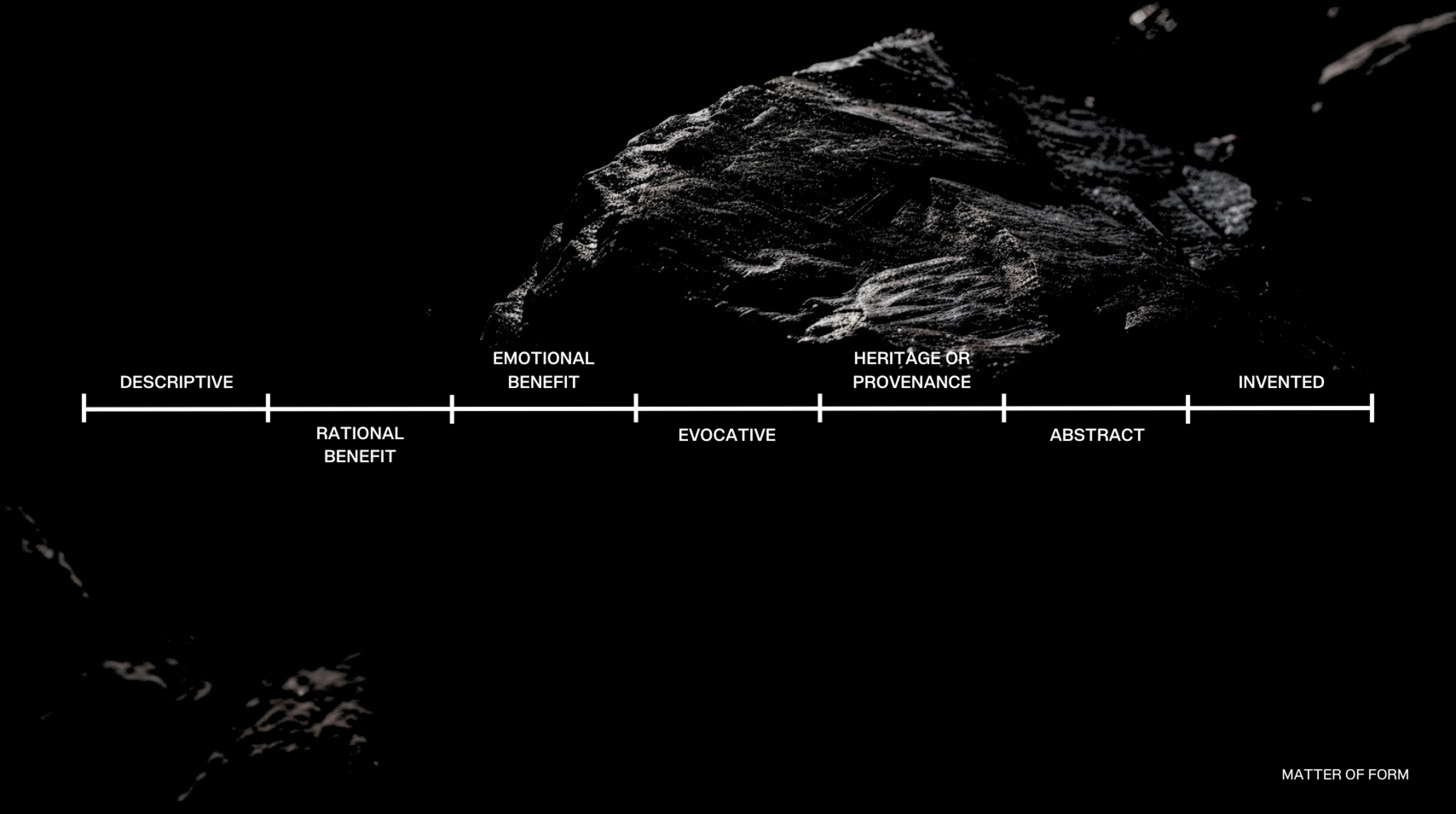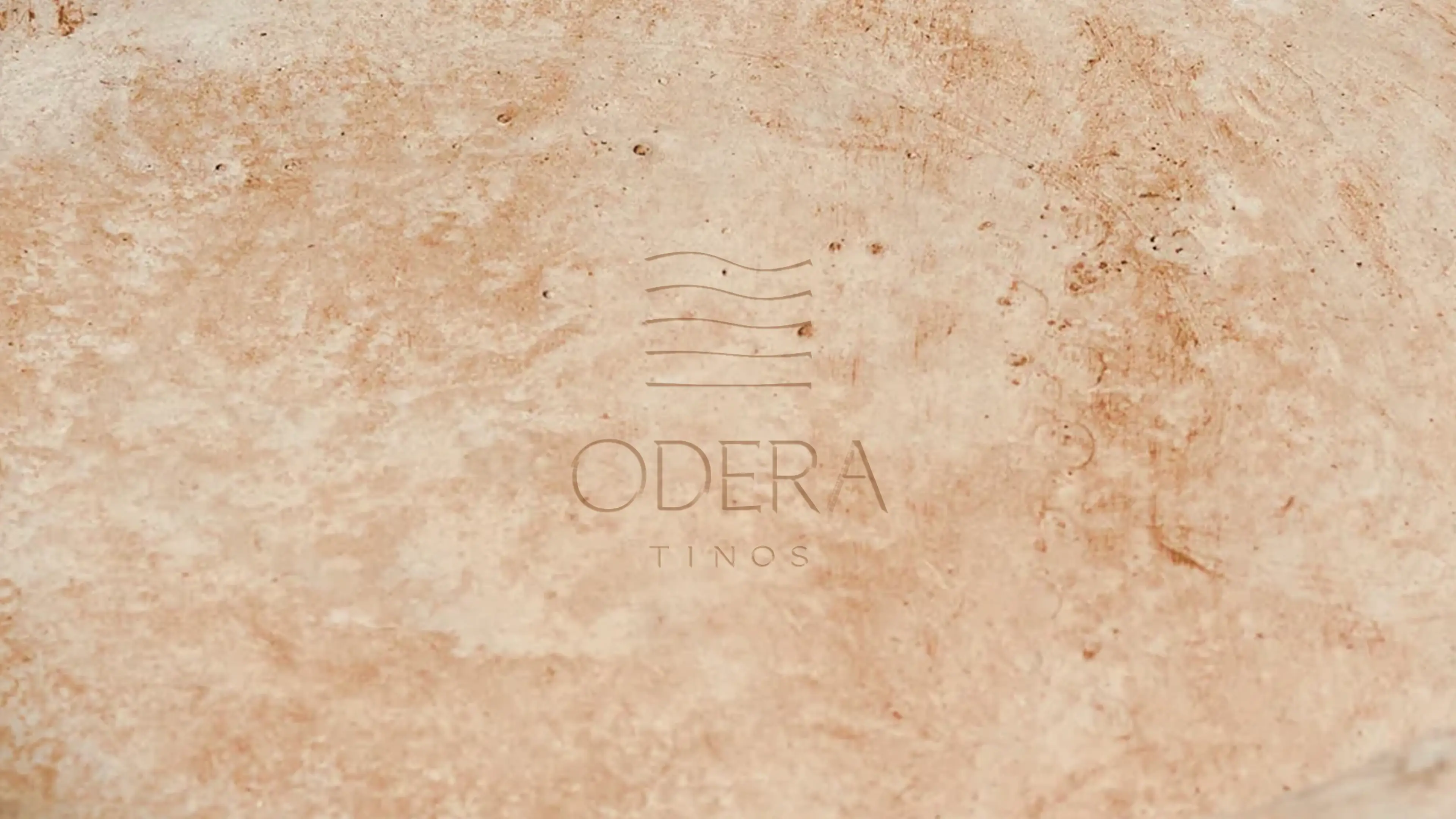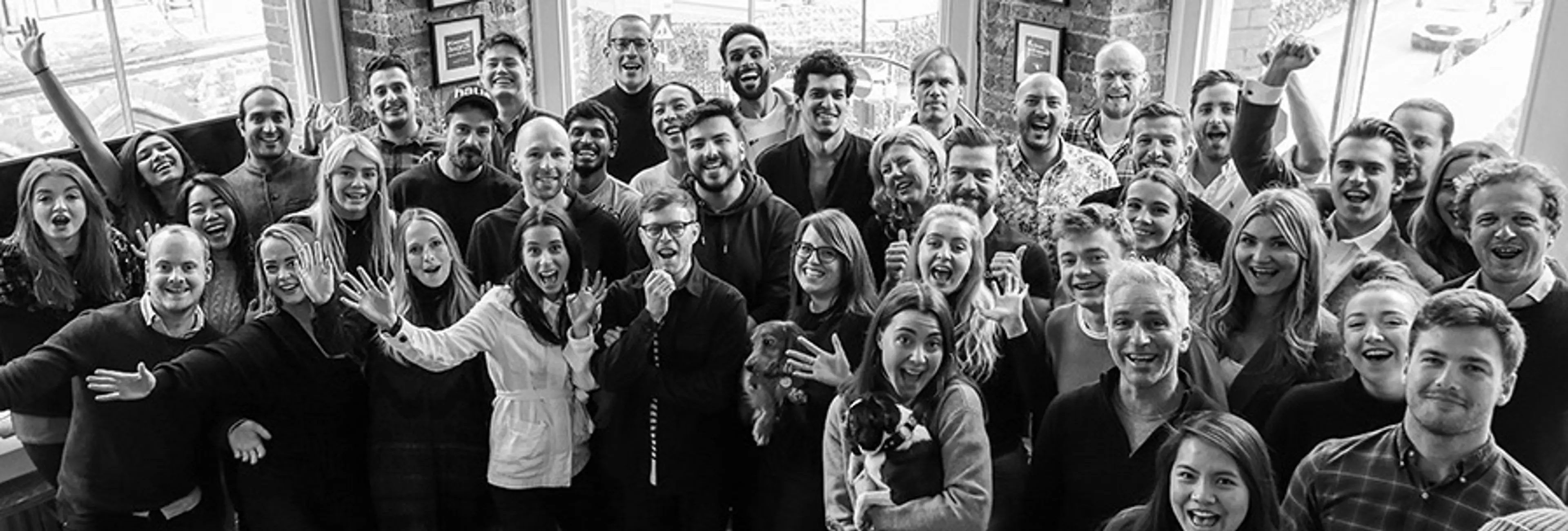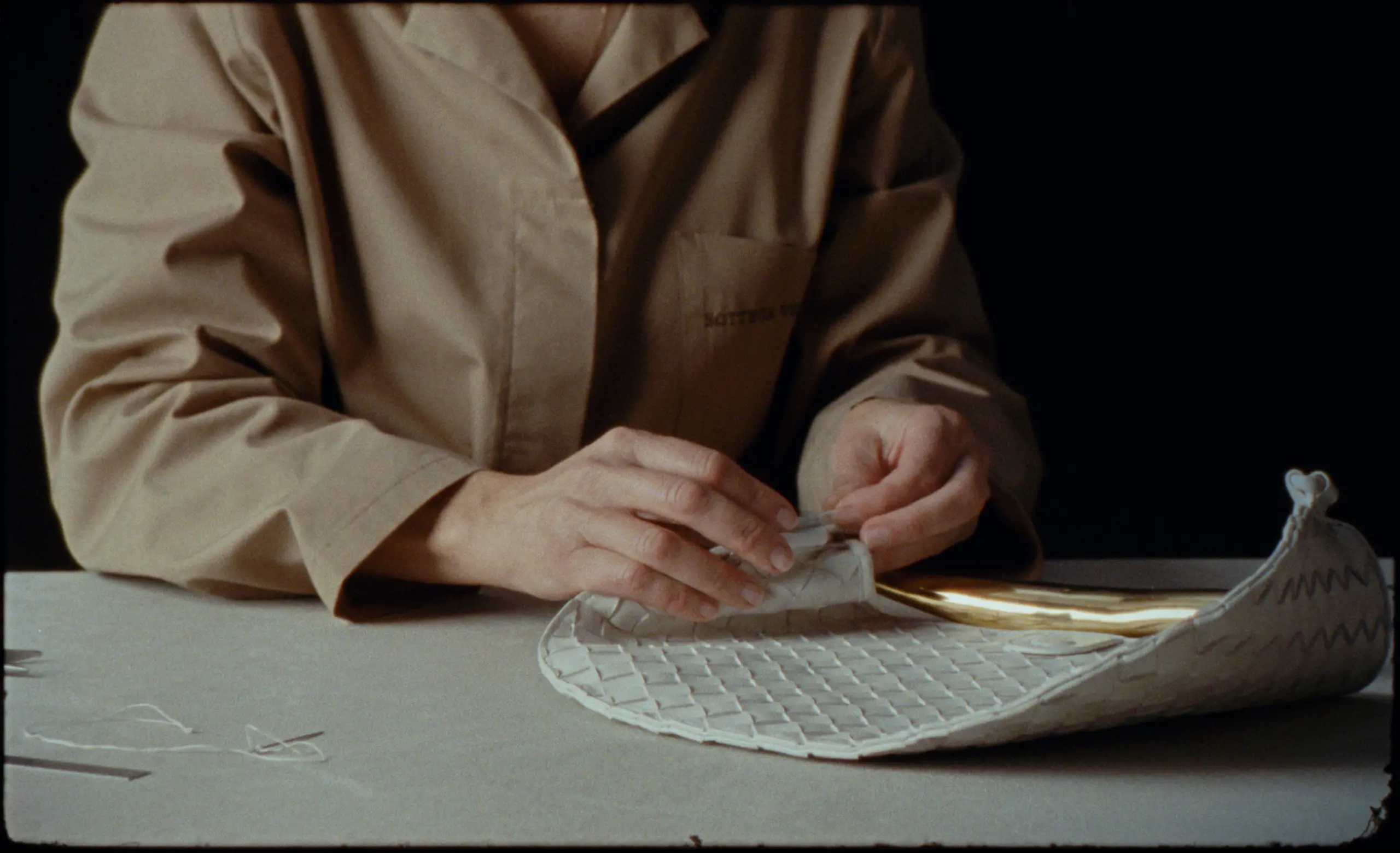
Brand & CX
1 Jun 2024
5 Min Read
What's In a Name? Turning Words into Brands
With insights from Matter Of Form Strategy Director James Lees, who has masterminded many names in his time, we unpick the art of turning mere words into brand worlds – from the nuances of nomenclature to the stories behind luxury favourites, culminating in actionable takeaways for those in need of a name.
Naming is by far the hardest part of branding, because it's so subjective. Our psychological associations between words and ideas are unique to the individual. One person's seal of approval is another's veto.
"With a name, we're trying to envision the future – the future associations, the future experience and therefore the future value, which is really difficult."
Often in naming processes, you end up looking at copious amounts of words without thinking about them as brands – entities that will exist in the world, that will live and breathe. The name will have value built into it over time. It's a vessel. Everyone thinks of the name as the storytelling device at the very start of a brand's life, but ultimately it becomes a vessel for the wider meanings and associations of that brand.
Consider completely nonsensical names like Uber. Uber is the German term for 'over' or 'beyond'. To a historian, the term could conjure Nietzsche's concept of Übermensch, which was later used in the Nazi regime. But now, to the populations of 70 countries and counting, 'uber' has become a verb. A means for getting from A to B. So despite potential Nazi associations, Uber has become one of the world's most valuable companies thanks to an assigned – branded – meaning.
Forcing Objectivity
When approaching a naming project with clients, our strategists will often start by throwing up various brands and asking their audience whether the name is compelling or not, doing so at speed to try to omit any pre-existing perceptions. Ultimately, it's impossible to look at an established name like Six Senses or Four Seasons or One & Only (bizarrely all numerical names) and separate the name from the experience. Whereas when we're going through a naming process, clients will be viewing abstract words in a keynote and they'll either like them or they won't – the reasons for and against being, again, entirely subjective.
To get anywhere, we have to force objectivity.
Or at least an element of it. Right from the beginning. We do so by agreeing upfront what kind of naming we're looking for. Names exist on a spectrum, ranging from descriptive and benefit-based to abstract to invented.

A huge portion of luxury brands are named after their founders: Tom Ford, Ferrari, Burberry, Hilton, The Doyle Collection, Christie's and so on. They're an ode to heritage and provenance, as are brand names like Moncler – an abbreviation of the Alpine town, Monestier-de-Clermont.
Others are more benefit-based, directly or indirectly – COMME des GARÇONS means "like boys" in French, a nod to their distressed, tomboy-ish womenswear. Acne Studios would be classed as evocative, as an acronym for 'Ambition to Create Novel Expressions'. Moving into abstract, 7 For All Mankind straddles the boundary, having based itself on a study that the average person owns seven pairs of denim jeans. At the top end of the spectrum, Rolex founders pulled the name from thin air purely because it was easy to pronounce across every language.
It's important to note names can be a combination, they can flex on the spectrum. Sometimes brands will pair an evocative term with something more descriptive for grounding, therefore alleviating the need for contextual support.
The immediate pro to the right-hand side of the spectrum is they're more ownable. Invented names are essentially sounds, competition is scarce. The more descriptive, the higher the chances it's been done before. Trademarks are almost impossible if a new brand wants to be descriptive only. In luxury, names tend to locate themselves on the right. The con of these, however, is the names require more contextual support than those to the left. Rich storytelling, graphics and clever marketing from the jump is essential to convey the brand behind an abstract or invented name.
These are the kinds of parameters that steer and drive the creativity of both consultants and clients. Next steps are usually to set a framework by which we filter anything we generate, whether that be functional conditions like legalities or needing a name fit for global audiences, or simply linguistic or phonetic preferences – perhaps you want to avoid a certain sound or letter.
Regardless of the specifics, the criteria must be robust.
When we were naming Odera – the first luxury hotel offering on the relatively unknown island of Tinos, one of the Cyclades – we had certain brand conditions, a need to link the island's story. Tinos is known as the home to Aoelus, the Greek god of the winds. The myth goes that Heracles (Hercules to the Romans), angered by their abandonment of the Argonauts, killed Aoelus' sons. In grief and fury, the wind god released a perennial gale across the island as revenge, today known as the infamous meltemi. Odera sprung from the Ancient Greek for wind 'aeras' – a portmanteau of 'ode to the wind'.

If you can make a link between the name and the story you're telling, the whole concept works harder because it feels like a more tied-together concept. It sinks into the brain more easily because you're making those links for them.
"Nike is a brilliant example of this. Named after the winged goddess of victory, their mission statement is to bring inspiration and innovation to every athlete* in the world. Their belief is *if you have a body, you're an athlete. Their brand line: Just Do It. It all ties together so well, rooted in this one idea yet translated at every level."
While it's impossible to say what makes a good name, those with a story behind them are the ones we lean into. Those names that have a bit of depth and hidden links there to be uncovered.
"It feels like it latches onto the concept and brings it to life."
For fans of a brand, story also provides a deeper thing to scratch at or unlock – another layer of the narrative. Some names build the lore of a brand, the rationale being for the 'insiders', those who are more dedicated. An IYKYK quality. It's similar for logos that have wit or cleverness to them. It creates what's known as 'a smile in the mind'. A reward for people who 'get it'.
Post-generation phase comes final selection. During this time, it’s vital for us to present the names in such a way that they feel real for our clients. Because despite the parameters and criteria, we’ll continue to come up against that innate subjectivity throughout. Rather than just a word or a phrase on a page, we’ll offer rationales – the story, the why. We’ll then show it in context, whether that’s on merchandise or signage or marketing collateral. It goes back to this idea of reframing, we present options as the brand, not a potential name.
Takeaways To Streamline The Brand Naming Process
For those ready to rise to the challenge, we'd urge you to stick to three fundamentals.
01
Force Objectivity The process is going to be different for every naming project. What works for a founder-led boutique won't for a global enterprise. We have a set of proprietary frameworks and criteria we work against to ensure we make progress in our creativity, alongside our clients. It's a collaborative process. But with collaboration comes more voices, more subjectivity. The best and only place to start with a name is to map your parameters. It is an absolute must.
02
Loosen Up Bad ideas can lead to the very best. Don't limit your thinking beyond the criteria you've set – and even then, rules are made to be broken. In our process, we'll generate thousands of potential names to find the right one. And then a thousand more. Begin by being unafraid of breadth, let your ideas flow unfiltered. Because your framework is already in place to filter and narrow your selection pool later on.
03
Overcome Uncertainty (Hopefully) you'll have made a selection based on reason. Whether a reference to criteria or a feeling. Coming down to a final choice, uncertainty can be usual. If you’re having second thoughts, know that the stage after naming – branding, visual identity, experience design – will be where the names take on more value and meaning, overcoming the uncertainty that may rear its head when it’s just a word on a page, before associations have begun to build and value starts to bud. If, after that, you’re still uncertain, call us.
Or – work with us from the word go. Whether you're a long-standing business or a startup, we can craft a name with that intangible quality that sticks in the mind. Get in touch with one of our consultants via [email protected] to chat specifics.
Brand & CX





